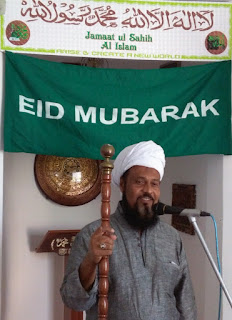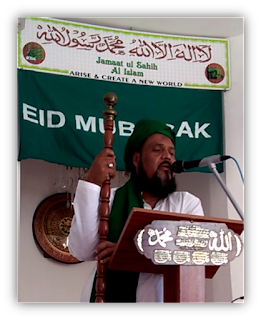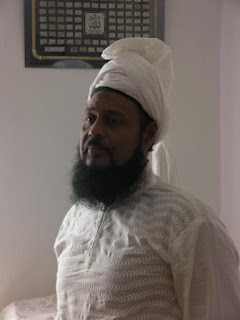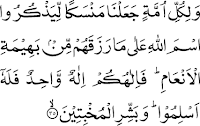Insha-Allah, we celebrate
the Eid-ul-Adha on Sunday 05 October 2014. Therefore, in today’s Friday Sermon,
I shall put before you some Hadiths which has connection with the Eid-ul-Adha.
Abdullah ibn
`Abdul-Rahman ibn Abza from his father (May Allah be pleased with him)
narrated that the Prophet (peace be upon him) used to say in the morning and in
the evening: “We wake up on pure Islam, the word of Tawhid (monotheism)
and on the religion of our Prophet Muhammad (peace b upon him) and on the
religion of our father Ibrahim (Abraham) who was purely a Muslim and never was
from the polytheists.”(Ahmad)
Hazrat Abdullah Ibn
Umar (May Allah be pleased with him) narrated that Hazrat
Muhammad (peace be upon him) recited out loud : “Labbaik Allahumma
Labbaik, Labbaik Laa Sharika Laka Labbaik, Innal Hamda wan-Ni’mata Laka wal
Mulk, Laa Sharika Laka” – (Translation) I respond
to Your call O Allah, I respond to Your call, and I am obedient to Your orders,
You have no partner, I respond to Your call All the praises and blessings are
for You, All the sovereignty is for You, And You have no partners with you. –
He cried out that attestation of the unity of God (that is, the Talbiya)
and that is all. (Bukhari & Ahmad)
Hazrat Shaddad ibn
Aws (May Allah be pleased with him) narrated that Hazrat Muhammad (peace
be upon him) used to recite this supplication (duah) in
his Salat(prayer): “O Allah, I ask You for steadfastness in
keeping Your command. And I ask You for firmness of resolution in
(pursuing) the right path…” Therefore, even for doing good deeds,
pursuing the right path, there cannot be ‘firmness of resolution’ without duahs (supplication
to Allah).
Hazrat Muhammad
(peace be upon him) was the one who showed the most firmness and perseverance
and also he used to seek the help of Allah through prayer/supplications to
Allah (duah), and he sought guidance, that is, the right path, intelligence and perspicacity. This is what is called ‘Rusht’ (the ability to
distinguish good and evil).
 “...And I ask You
(enablement) to be thankful for Your favours and to worship You in the
best way. And I ask You for a truthful tongue and ‘Qalbi Saleem’ (a
sound heart)…”
“...And I ask You
(enablement) to be thankful for Your favours and to worship You in the
best way. And I ask You for a truthful tongue and ‘Qalbi Saleem’ (a
sound heart)…”
Now, nobody has
received a purer heart than Hazrat Muhammad (peace be upon him) and there has
not been any person who has been more truthful than him on earth. Therefore, in
this way, we can correctly say that it is Allah who gives the ‘Qawli
Sadid’(clear/truthful speech), ‘Qawli Salim’ (pure
speech) and ‘Rusht’ (the
ability to distinguish good and evil), otherwise there is no other means to
acquire all these!
Then Hazrat Muhammad
(peace be upon him) said: “…And I seek refuge in You from the mischief
that You know and I ask You for the good that You know. And I seek Your
forgiveness for (sins) that You know Indeed, You are the Best Knower of the
unseen.”
 (A special message of Muhyi-ud-Din Al Khalifatullah Hadhrat Munir Ahmad Azim Saheb (atba) on the occasion of the Eid-ul-Adha, was published in two newspapers in Mauritius on Friday 01 Sep. 2017: Le Socialiste (Pg. 2), Le Mauricien - Forum (Pg. 15).
(A special message of Muhyi-ud-Din Al Khalifatullah Hadhrat Munir Ahmad Azim Saheb (atba) on the occasion of the Eid-ul-Adha, was published in two newspapers in Mauritius on Friday 01 Sep. 2017: Le Socialiste (Pg. 2), Le Mauricien - Forum (Pg. 15). 


















